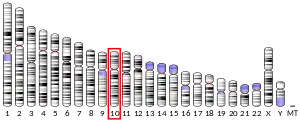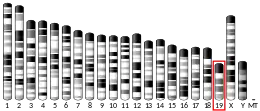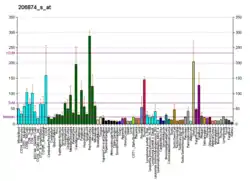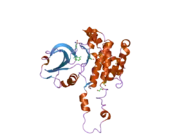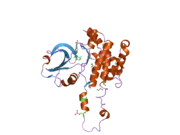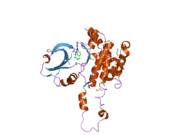STE20-like serine/threonine-protein kinase is an enzyme that in humans is encoded by the SLK gene.[5][6]
Interactions
SLK (gene) has been shown to interact with PDZK1.[7]
SLK is a mammalian gene located on chromosome 10. it has also been cloned in rats.[8] There is a whole family of STE20 like protein kinases, which has been divided into three categories. the most important p21-activated kinase (PAK), germinal center kinases (GCK) and Pleckstrin homology domain containing PAK (PHPAK).[9] SLK gene plays an important role in development, termination and differentiation of cells and tissues. the main enzyme SLK gene produces is called Ste20-like kinases which was formerly known as Ste20-like serine/threonine protein kinase. the balanced expression of SLK gene is very essential for the correct development of body parts in all mammals. this enzyme is also involved in cell movement and cell cycle. The expression of SLK gene in germ line cell is regulated by phosphorylation of PLK1, which is another gene involved in mitosis. Ste20- like kinases manages the correct orientation of micro-tubules during inter-phase level of cell cycles. Underproduction of Ste20-like serine/threonine-protein kinases can result in micro-tubule fibers to detach from chromosomes. It also functions in activation/deactivation of apoptosis in cells, as well as organization and adhesion of cell to shape an appropriate organ.
References
- 1 2 3 GRCh38: Ensembl release 89: ENSG00000065613 - Ensembl, May 2017
- 1 2 3 GRCm38: Ensembl release 89: ENSMUSG00000025060 - Ensembl, May 2017
- ↑ "Human PubMed Reference:". National Center for Biotechnology Information, U.S. National Library of Medicine.
- ↑ "Mouse PubMed Reference:". National Center for Biotechnology Information, U.S. National Library of Medicine.
- ↑ Celenza JL, Carlson M (Sep 1986). "A yeast gene that is essential for release from glucose repression encodes a protein kinase". Science. 233 (4769): 1175–80. Bibcode:1986Sci...233.1175C. doi:10.1126/science.3526554. PMID 3526554.
- ↑ "Entrez Gene: SLK STE20-like kinase (yeast)".
- ↑ Gisler SM, Pribanic S, Bacic D, Forrer P, Gantenbein A, Sabourin LA, Tsuji A, Zhao ZS, Manser E, Biber J, Murer H (Nov 2003). "PDZK1: I. a major scaffolder in brush borders of proximal tubular cells". Kidney International. 64 (5): 1733–45. doi:10.1046/j.1523-1755.2003.00266.x. PMID 14531806.
- ↑ Ste20-like kinases SLK, at the crossroad
- ↑ Al‐Zahrani, Sekhon. “Essential Role for the SLK Protein Kinase in Embryogenesis and Placental Tissue Development.” Developmental Dynamics, vol. 243, no. 5, Wiley Subscription Services, Inc, May 2014, pp. 640–51, doi:10.1002/dvdy.24106
- ↑ Cybulsky, Papillon. “Ste20-Like Kinase, SLK, a Novel Mediator of Podocyte Integrity.” American Journal of Physiology. Renal Physiology, vol. 315, no. 1, American Physiological Society, July 2018, pp. F186–F198, doi:10.1152/ajprenal.00238.2017
- ↑ Cybulsky, Takano. “The Ste20-Like Kinase SLK Promotes P53 Transactivation and Apoptosis.” American Journal of Physiology. Renal Physiology 297.4 (2009): 971–980. Web
Further reading
- Yan Y, Nguyen H, Dalmasso G, Sitaraman SV, Merlin D (Feb 2007). "Cloning and characterization of a new intestinal inflammation-associated colonic epithelial Ste20-related protein kinase isoform". Biochimica et Biophysica Acta (BBA) - Gene Structure and Expression. 1769 (2): 106–16. doi:10.1016/j.bbaexp.2007.01.003. PMC 1865517. PMID 17321610.
- Olsen JV, Blagoev B, Gnad F, Macek B, Kumar C, Mortensen P, Mann M (Nov 2006). "Global, in vivo, and site-specific phosphorylation dynamics in signaling networks". Cell. 127 (3): 635–48. doi:10.1016/j.cell.2006.09.026. PMID 17081983. S2CID 7827573.
- Chaar Z, O'reilly P, Gelman I, Sabourin LA (Sep 2006). "v-Src-dependent down-regulation of the Ste20-like kinase SLK by casein kinase II". The Journal of Biological Chemistry. 281 (38): 28193–9. doi:10.1074/jbc.M605665200. PMID 16837460.
- Gisler SM, Pribanic S, Bacic D, Forrer P, Gantenbein A, Sabourin LA, Tsuji A, Zhao ZS, Manser E, Biber J, Murer H (Nov 2003). "PDZK1: I. a major scaffolder in brush borders of proximal tubular cells". Kidney International. 64 (5): 1733–45. doi:10.1046/j.1523-1755.2003.00266.x. PMID 14531806.
- Nakayama M, Kikuno R, Ohara O (Nov 2002). "Protein-protein interactions between large proteins: two-hybrid screening using a functionally classified library composed of long cDNAs". Genome Research. 12 (11): 1773–84. doi:10.1101/gr.406902. PMC 187542. PMID 12421765.
- Dan I, Watanabe NM, Kusumi A (May 2001). "The Ste20 group kinases as regulators of MAP kinase cascades". Trends in Cell Biology. 11 (5): 220–30. doi:10.1016/S0962-8924(01)01980-8. PMID 11316611.
- Eichmuller S, Usener D, Dummer R, Stein A, Thiel D, Schadendorf D (Jan 2001). "Serological detection of cutaneous T-cell lymphoma-associated antigens". Proceedings of the National Academy of Sciences of the United States of America. 98 (2): 629–34. doi:10.1073/pnas.021386498. PMC 14639. PMID 11149944.
- Yamada E, Tsujikawa K, Itoh S, Kameda Y, Kohama Y, Yamamoto H (Feb 2000). "Molecular cloning and characterization of a novel human STE20-like kinase, hSLK". Biochimica et Biophysica Acta (BBA) - Molecular Cell Research. 1495 (3): 250–62. doi:10.1016/S0167-4889(99)00164-0. PMID 10699464.
- Sabourin LA, Tamai K, Seale P, Wagner J, Rudnicki MA (Jan 2000). "Caspase 3 cleavage of the Ste20-related kinase SLK releases and activates an apoptosis-inducing kinase domain and an actin-disassembling region". Molecular and Cellular Biology. 20 (2): 684–96. doi:10.1128/MCB.20.2.684-696.2000. PMC 85169. PMID 10611247.
- Nagase T, Seki N, Ishikawa K, Ohira M, Kawarabayasi Y, Ohara O, Tanaka A, Kotani H, Miyajima N, Nomura N (Oct 1996). "Prediction of the coding sequences of unidentified human genes. VI. The coding sequences of 80 new genes (KIAA0201-KIAA0280) deduced by analysis of cDNA clones from cell line KG-1 and brain". DNA Research. 3 (5): 321–9, 341–54. CiteSeerX 10.1.1.319.3770. doi:10.1093/dnares/3.5.321. PMID 9039502.

